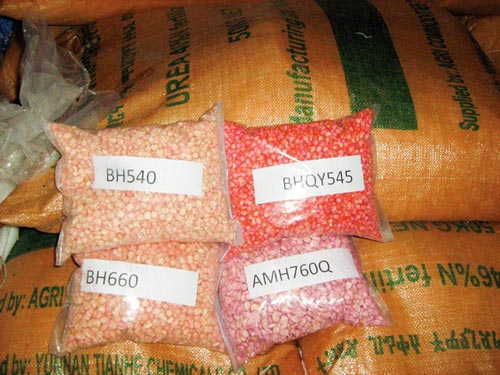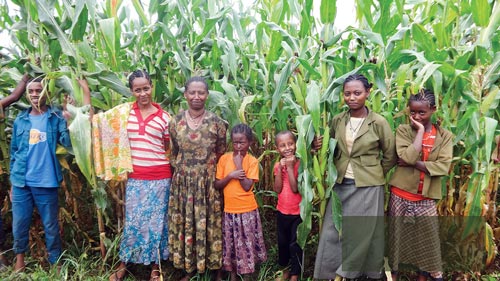The Ethiopian government has embarked on a new initiative to improve nutritional security in the country through the widespread demonstration and use of quality protein maize (QPM), a type of maize that contains enhanced levels of protein. The new government initiative is a high-level endorsement of CIMMYT’s five-year Nutritious Maize for Ethiopia (NuME) project.

The principal goal of NuME is to improve the food and nutritional security of Ethiopians through the widespread application and use of QPM and improved agronomic practices that increase productivity. NuME project leader Adefris Teklewold said, “The new government initiative will play a major role in making the QPM technology and inputs available to a larger number of maize farmers living beyond NuME target woredas (districts).”
The key aspects of NuME are in the government QPM scale-out plan, “Strengthening Quality Protein Maize Promotion and Seed Supply Systems in Ethiopia.” The plan sets a target to increase the area producing QPM in Ethiopia to 200,000 hectares in 2015-2017, roughly 10 percent of the total land currently devoted to maize production in the country.
After critical review and enrichment by key stakeholders, the initiative was approved by Ato Wondirad Mandfero, State Minister of Agriculture, as “an initiative that links agriculture and nutrition.” Mandfero issued directives for the initiative’s immediate implementation in high-potential maize growing areas in the country, as well as the inclusion of QPM technology dissemination in the regular government extension program starting this year. The Ethiopian government’s agricultural extension program focuses primarily on assisting small-scale farmers to improve their productivity by disseminating research-generated information and technologies.

An alliance of key government institutions engaged in the agriculture sector, including the Ethiopian Agricultural Transformation Agency, the Ethiopian Ministry of Agriculture (MoA), other key development partners and CIMMYT support the scale-out plan and will work together to help execute a variety of initiatives to fulfill the food and nutritional security of Ethiopians.
The government initiative will create synergies with NuME and expand QPM through more field demonstrations and field days. NuME is achieving success with these methods, but the government expansion will make the QPM technology and inputs available to a larger number of maize farmers living beyond NuME project woredas. The government initiative will also create opportunities for more collaborators to participate in the effort and thus for more experience-sharing and impact on the ground. According to Teklewold, “The ultimate winner will be small-scale Ethiopian farmers who will have access to the technology through a wide variety of outlets and extension services.”
A sizable number of Ethiopian families depend on maize as their staple food source. However, a maize-based diet is generally deficient in the essential amino acids lysine and tryptophan. This can leave families — and particularly children — at risk for protein deficiency, especially in circumstances where intake of alternative protein sources is limited.
NuME promotes QPM, maize varieties developed by CIMMYT scientists through conventional breeding that contains enhanced levels of protein compared to common maize varieties. Two CIMMYT scientists (Dr. Evangelina Villegas and Dr. Surinder Vasal) who worked to develop QPM in the 1980s and 1990s were awarded the World Food Prize in 2000 for their work. QPM helps to fill the lysine intake gap in circumstances where maize is the dominant source of calories and protein and intake of alternative protein sources is limited. This analysis is strongly supported by various studies conducted in West Africa, Latin America and Asia, which concluded that children in vulnerable environments could benefit nutritionally from QPM consumption1.
Key objectives outlined in the scale-out proposal include:
- Identifying options to enhance seed businesses and impact pathways by identifying constraints and opportunities in the seed value chain.
- Enhancing the capacity of regulatory agencies and developing systems to track improved seed use and impact.
- Demonstrating and creating awareness of seed companies and farmers regarding the performance and nutritional superiority of QPM varieties.
- Providing sufficient quantities of quality of QPM varieties to farmers in a sustainable manner.
- Supporting seed companies and community-based organizations to improve their capacity in seed production skills, post-harvest seed handling and seed business management to enable them to absorb available QPM varieties and increase quality seed.
The government initiative notes that five QPM varieties have already been officially released by Ambo, Bako and Melkassa Research Centers. Basic and adaptive research activities are being conducted concurrently by different centers of the Ethiopian Institute of Agricultural Research (EIAR) in collaboration with CIMMYT, to develop new improved QPM varieties adapted to different maize production environments and evolving stresses in the country.
As part of the initiative, a strategy will be developed to start QPM adoption by ensuring a sufficient QPM seed supply by: improving access to credit and coordinated production of all seed categories (breeder, pre-basic, basic and certified) along the value chain; testing and demonstrating a stockist distribution plan for more efficient seed distribution; and providing seed business management and production training to emerging seed producers.
Target areas selected under the initiative include Agricultural Growth Program (AGP) woredas, most of which are in high-potential maize growing areas. An estimated 2.4 million people, comprising some 400,000 households in AGP woredas in Amhara, Oromia, SNNPR and Tigray regions, are expected to benefit from this initiative.
The NuME project is implemented by CIMMYT and funded by Canada’s Department of Foreign Affairs, Trade and Development (DFATD). Among CIMMYT’s partners helping to implement NuME are EIAR, the Sasakawa Africa Association/ Sasakawa Global 2000; MoA; the Ethiopian Ministry of Health; the Ethiopian Health and Nutrition Research Institute; Farm Radio International; Harvard School of Public Health; universities; agricultural, technical, vocational and educational training centers; and numerous seed companies.
 Nutrition, health and food security
Nutrition, health and food security